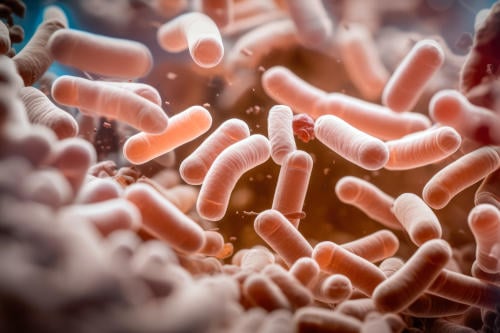Statistics from the website “ADHD UK” estimate that there are 708,000 children living in the UK with ADHD (Attention Deficit Hyperactivity Disorder). Children with the condition may typically display some of the following:
FOCUS ISSUES
For example:
- Getting bored
- Becoming distracted
- Losing things
- Difficulty listening
OVERACTIVE TENDENCIES
For example:
- An inability to keep still
- Moving around frequently
- Talking too much
IMPULSIVE TRAITS
For example:
- Impatience
- Interrupting
- Lack of safety awareness
If you have a child with ADHD, have you ever wondered if a change in their gut health might help with their symptoms? There is more evidence accruing to indicate that there could be a link.
Paula Smith, from Middlesex is mum to Scott, now in his 30’s. Scott was not diagnosed with ADHD until his twenties. Paula contemplates how things may have been had she known firstly that he had ADHD, and secondly, that there was a potential link between the condition and gut health.
She explains, “He reacted to various foods and had regular issues from a young age. I didn’t know that he had ADHD. After his diagnosis, it became clear to both of us that he had been symptomatic throughout his childhood. He also suffered with food sensitivities.”
What are Gut Bacteria?

Gut bacteria are a collection of microorganisms that live in our stomach, intestines and colon. Research suggests that people with ADHD may have an uneven distribution of gut bacteria, which can cause inflammation after the consumption of certain foods. This in turn can affect the brain and trigger ADHD symptoms.
Paula’s experience may validate these findings. She states, “Cow’s milk gave Scott stomach-ache and made him sick. Similarly, eggs always upset his digestive system. Had I known about his ADHD and the suggested connection with the gut, I do feel like his stomach issues might have been more easily addressed.”
Canida albicans is a fungus that can be found in small amounts in the intestines which may cause an imbalance in gut bacteria. It has been suggested from different studies, such as “Gut mycobiome dysbiosis and its impact on intestinal permeability in attention-deficit/hyperactivity disorder”, (Liang-Jen Wang et al, April 2023) published in “The Study of Child Psychology and Psychiatry”, that children with ADHD appear more likely to have an imbalance in the gut’s natural fungus communities, with increased levels of candida albicans present that “might be associated with susceptibility to ADHD”.
Paula adds, “Things make sense now. Considering Scott’s stomach reactions to foods, and knowing about his ADHD, I think it is highly likely there is a link between the two.”
Scott, who teaches overseas, validates his mum’s perception. He states, “I am almost certain there is a link; everyone that I know with ADHD has gut issues.”
It is also important to grasp that people with ADHD may make food choices depending on their ADHD experience. This in turn affects their choice of food and potentially how their gut health and symptoms respond.
Scott continues, “Those who have ADHD live in a permanent fight/ flight situation, and experience hunger differently. They are often exhausted from masking and trying to focus all day; by mealtimes they are often too tired to eat healthily and often opt for fast food.”
“People with ADHD eat to fill their dopamine levels, consuming sugary foods or fizzy, caffeinated drinks, which can affect gut health and most likely their ADHD symptoms.”
“I crave sugar, it is like a drug. I suspect if I eliminate sugar completely, my ADHD symptoms would improve once the withdrawal period was over.”
What Conclusions Can I Make From so Much Information?

Unlike the past, we are now often presented with an abundance of information. We are lucky to have so much material at our fingertips, but how can we best use this information?
Some professionals who have researched a potential link between gut health and ADHD imply that alterations to a child’s diet could be beneficial in reducing the impact of ADHD symptoms.
Trusted health advisory group, “Everyday Health” recommend that that the following foods could be reconsidered when contemplating diet choices.
- Chocolate
- Wheat
- Eggs
- Milk
- Tomatoes
- Grapes
- Oranges
- Soy
- Corn
Other experts contribute similar thoughts, suggesting a review of the following:
- Sugary foods; sweets, cakes, biscuits
- Artificial colours/preservatives; flavoured drinks, fruit juices, pastries, cakes.
- Dairy, wheat, eggs and fruits; milk, white bread, fruits such as red apples, grapes, tomatoes.
As an adult, Scott has tried new foods, to see how it impacts on his ADHD. “I constantly tinker with my diet, and I am able to see clearly what makes a difference.”
“I am very aware how food affects my emotions; I would not experiment on a social night out, in case the evening was ruined.”
“For parents who have a child with ADHD, it could be a good idea to gently introduce new foods as young and often as possible, and try to either make it fun, or disguise it somehow and test the impact.”
You may want to consider gentle changes to your child’s diet, but it is important to speak to a professional beforehand such as your GP, dietician or paediatrician. They will help you ensure healthy decisions, and that you don’t unwittingly eliminate foods that are essential for your child’s good health and well-being.
There are other people that you can reach out to, such as your child’s SENCO, or health visitor. There are also support groups online and in person where concerns can be aired in a safe space.
What if I Find the Information Confusing About ADHD and Gut Health?

The best route for all parents is to consider proper professional advice before making any decisions about your child’s diet. There is not a “one size fits all” remedy when looking at relationships between ADHD and gut health. Make a note of any confusing areas, take expert advice, and then carefully consider your options to do what is best for your child.
Please note: The information provided within this blog, by SENsational Tutors, is for general information purposes only. We appreciate that every person is unique and any advice/experiences mentioned within the content of each blog may not be reflective of your own personal experience. All information on the site is provided in good faith and is for educational informational purposes only. It is not a substitute for professional advice. Before taking any actions based upon such information, we encourage you to consult with appropriate professionals.




